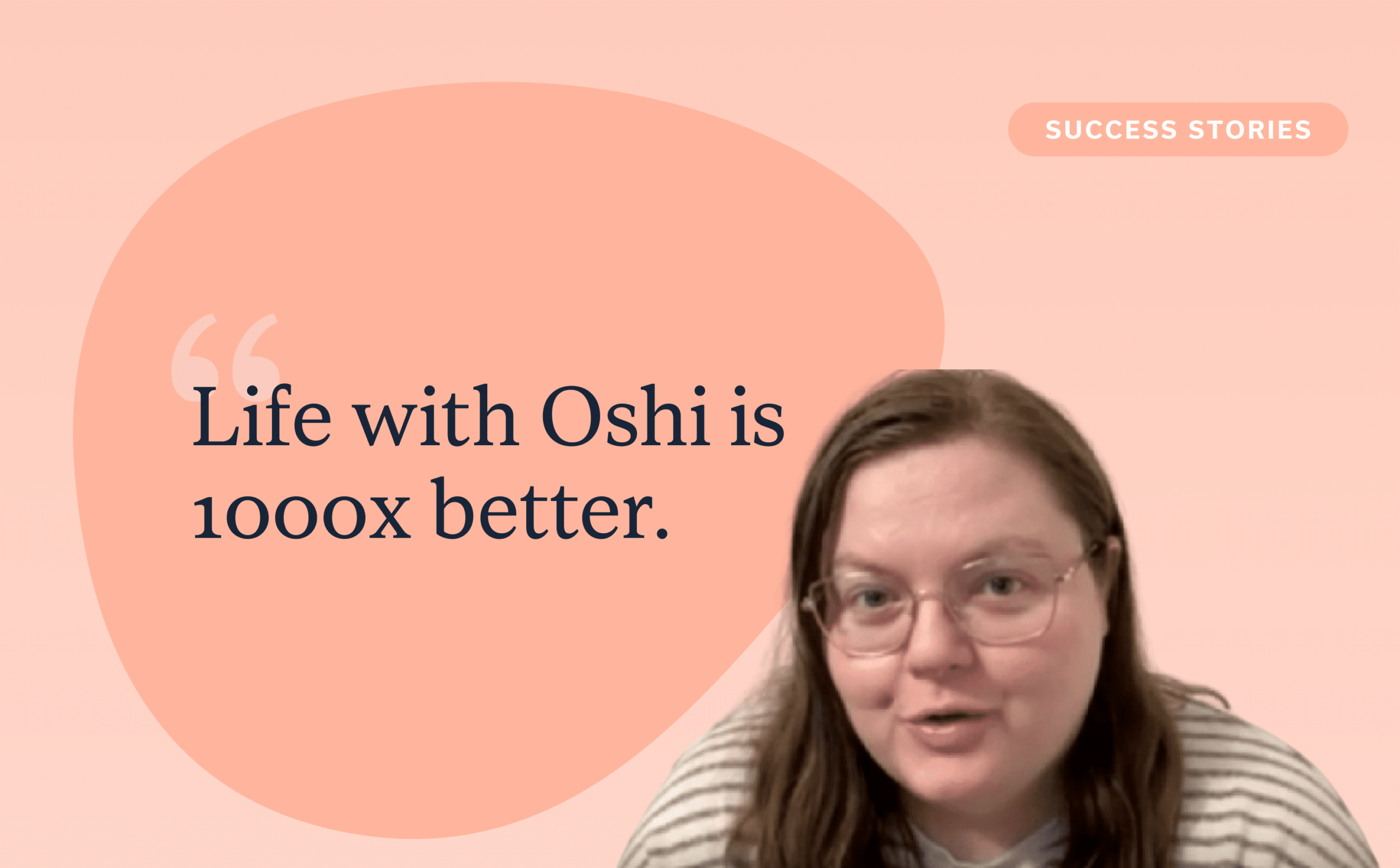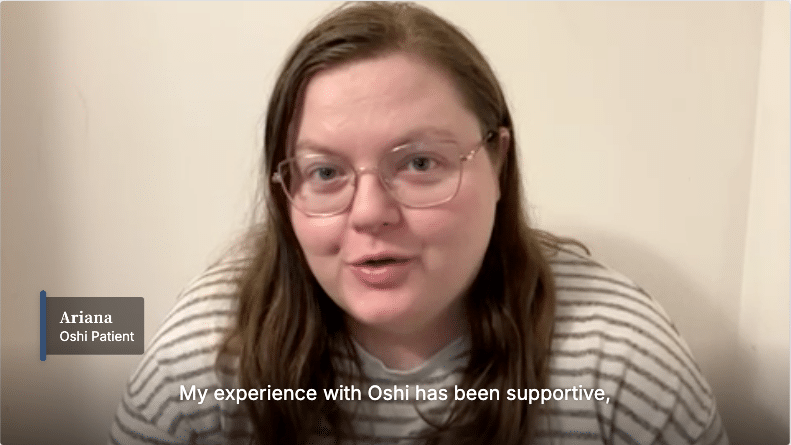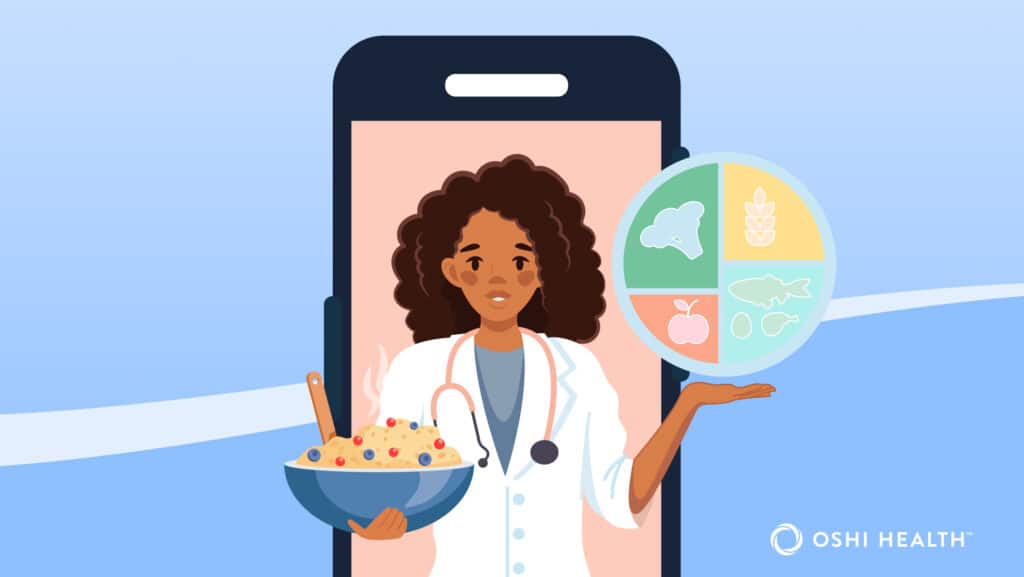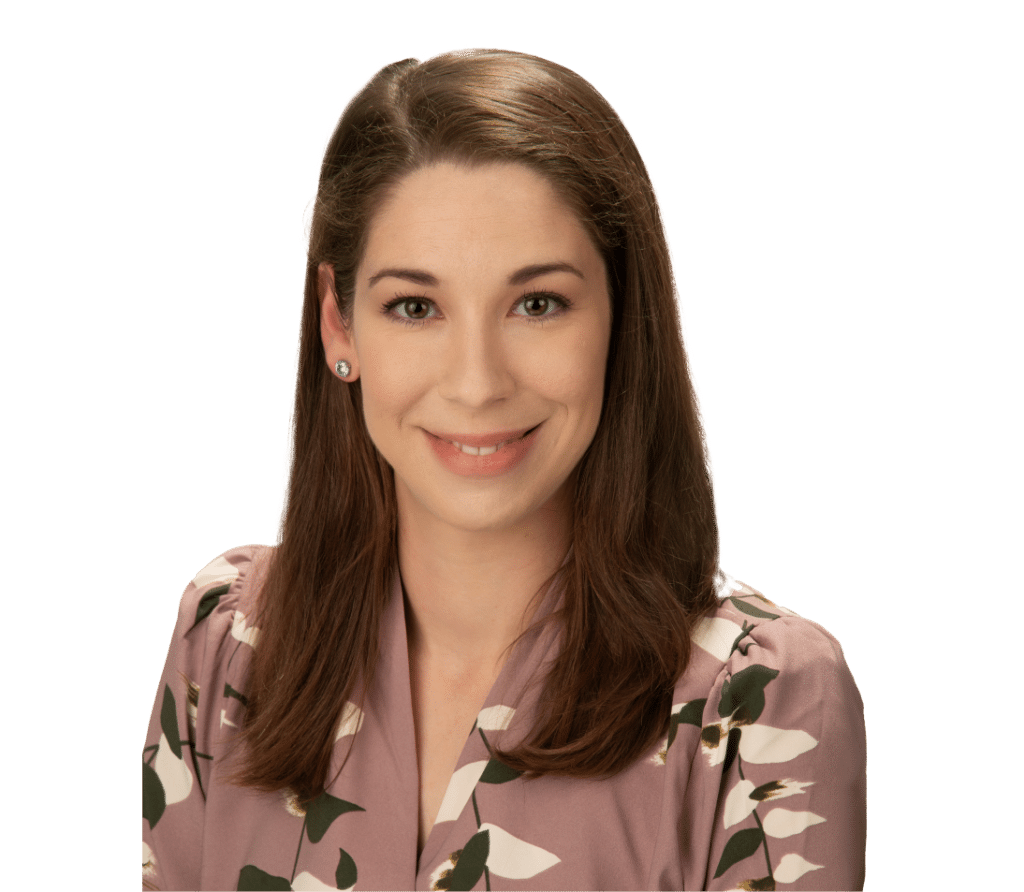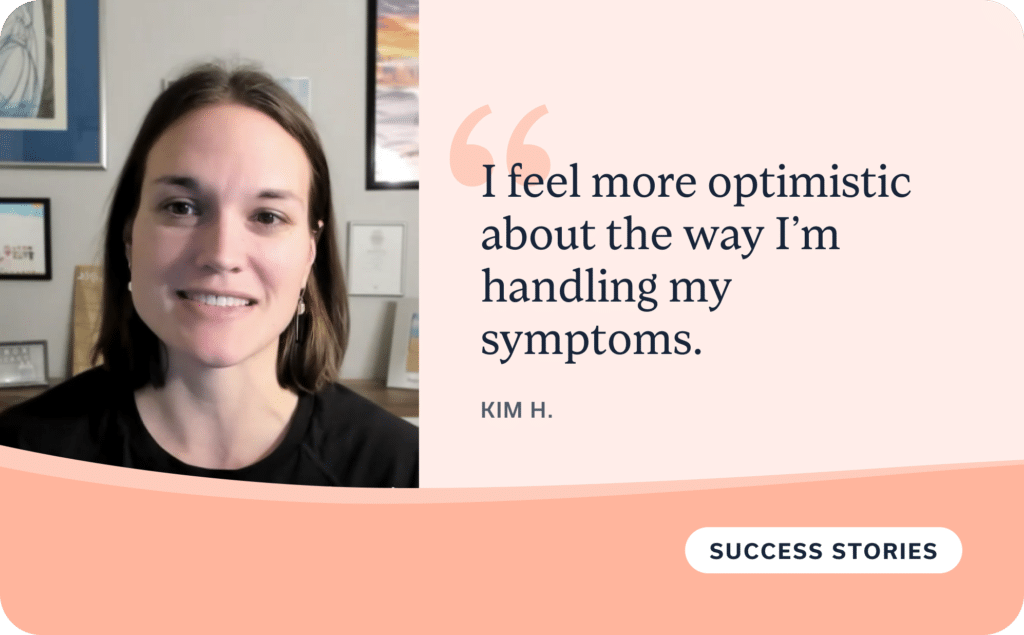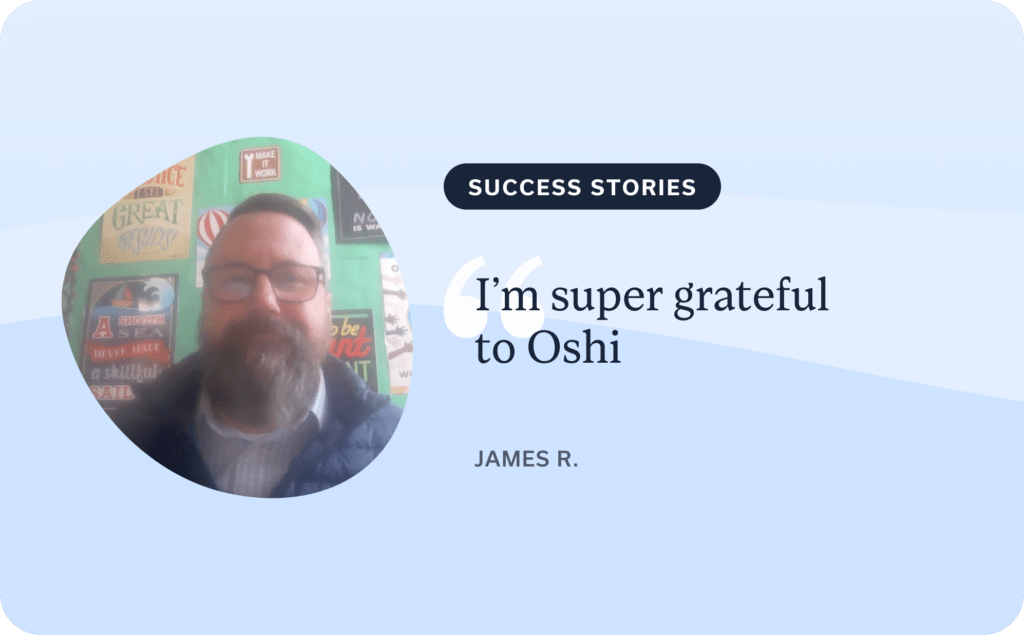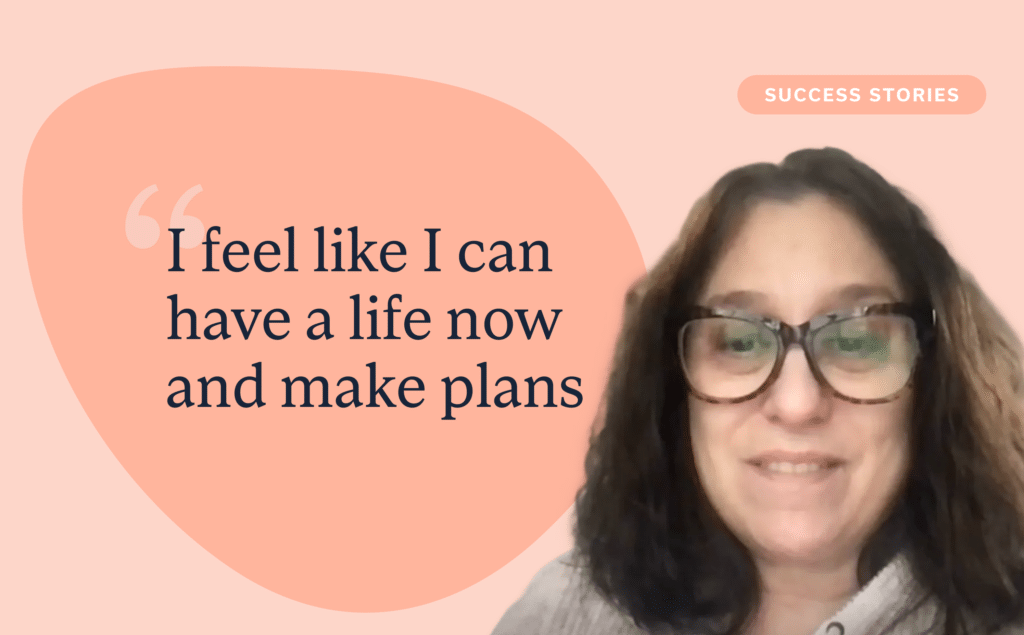Welcome to Oshi Patient Stories, an interview series where we hear from the real people who have found lasting relief from digestive symptoms with Oshi’s virtual gastrointestinal (GI) care. In today’s interview, Ariana tells us how her treatment with Oshi has shifted her perspective on what it means to be healthy.
Ariana discusses her experience with Oshi Health.
Can you describe your experience with Oshi in three words?
My experience with Oshi has been:
- Supportive
- Stress-free
- Flexible.
Everything I need is on the platform. Anytime I need to speak to the care team, they’re there, and it makes it easy for me to get things like my lab orders in or referrals, or even documentation to help me better understand my condition because it all shows up in the Oshi portal. Right there for me to access at any points, no matter where I’m at in the world. It’s all there. So that’s been my experience. It’s been a good experience.
How were digestive symptoms impacting your life before you found Oshi?
Life before Oshi was stressful, to be honest. It was me having to be my own GI expert, me having to do all of the research, me having to keep notes on my condition. Even though I had a GI here in the city that I lived in, they were so popular and had so many referrals that it was difficult to even get in to see them when you needed to.
So when I was experiencing, for example, increasingly lactose intolerant symptoms. I wasn’t quite sure what I could do to manage that. I couldn’t get in to see anybody, and even when I did get in to see anybody, the response was kind of like, “well, that’s not our problem. You need a dietitian,” and so then I would have to go and be a dietitian expert and find a dietitian to help me. Accessibility is important in managing liver disease and metabolic syndrome and anything else that affects your GI and when you really want to take care of yourself, but you’re having to be your own doctor and your own sounding board and your own data analyst. It just becomes exhausting and stressful.
With Oshi, I feel like the GI takes time to review my chart before I even come to my appointment. I feel like questions are asked at every appointment to find out where I’m at now. Has anything changed? Am I on any new meds? What all have I tried? How am I doing with my my journey and my struggles. And blood work is promptly put in. It’s easy to get an appointment if I need it. It’s easy to get a referral if I need it. I can just access the care team right in the app on my phone.
I feel like I’m seen and heard. I feel like if I bring up an issue I’m having, I’m not going to be dismissed or ignored. I do think in medicine that is important. I feel like the older I get, that becomes more important because I need to be able to trust the GI individual. I need to be able to know that if something does arise, I can tell them and it will be taken care of and we can work on it together because we’re a team. And I feel that way with Oshi.
They give me the opportunity to take care of myself, to hear from different GI professionals, to have the ease and access of care, but also the education that comes with it so that I can take care of myself and so not everything is on me to figure out. I would say life with Oshi is 1000 times better than life without.
What can you tell us about your treatment with Oshi?
There are a couple of things that I absolutely love about Oshi.
The first thing, they have an app. Apps are important. They might seem basic, but they are important. They can go with you anywhere. I love that no matter where I am in the world, no matter what I’m doing, if something comes up, if I have a question, if I lost my lab orders and I need a new one—it’s all there in the app. Easy to log in, easy to navigate, easy to talk to somebody within 24 hours. I don’t think I’ve ever had to wait longer than 24 hours for a response. Everything is easy about getting in contact and staying in contact and getting what I need from it.
I would say the second part is that there is a diverse care team available to me. So when I first started with Oshi, I just had a nurse practitioner GI specialist, and then when we were discussing my struggles with food, specifically. I get cravings for sugar like everybody else, but I can’t have a lot of sugar. There are certain things I can’t eat. It’s sometimes difficult for me to adhere to an eating schedule. So things like that, you know. When I discussed these frustrations with her and concerns with her, she referred me to a dietitian. It was as easy as her sending the referral in as soon as our appointment was done. And then I actually was able to, right that same day, schedule with the dietitian, and get in to see her. That was the easiest referral I’ve ever had in my life.
Then the dietitian was on my care team for a while. So there are people there who can help and resources there that come and go depending on my needs, and I like that it’s not set in stone. It’s not something that I have to continue after I got what I needed from the dietitian. You know, she didn’t see a reason for me to keep seeing her. I didn’t see a reason, so we departed, but she’s still there. So if something crops up, I can send her a message and say, “hey, you know, I’ve stumbled across some food things that I really need to discuss with you,” and then we can set up another appointment. I really like that care can kind of shift and evolve with me as I am getting better at managing my condition.
Meet Oshi's registered dietitians
Find lasting relief—and stay nourished
When you work with an Oshi registered dietitian, you’ll get personalized nutrition guidance, including help identifying potential food triggers, choosing gut-friendly supplements and recipes, and more.
How is your life different because of Oshi?
When I came to Oshi, I had actually already adopted several healthy habits, such as incorporating 150 to 200 minutes of exercise every week. I took tae kwon do, I did weightlifting sessions, I would go for walks around the block. I did whatever I could to to stay active and and keep moving around. But there are other ways that Oshi has meaningfully impacted my health, mental health, and physical health. And I think a key way that that has happened is shifting the focus from numbers and more on lifestyle nourishment and finding a rhythm and contentment that I can live with.
I think sometimes, especially in America, we focus a lot on just losing weight, and I’ve had a lot of GIs in the past who focused exclusively on the fact that I just wasn’t losing a lot of weight. And when you’re a weight trainer, you might be gaining healthy, lean mass, but not losing any pounds when you step on the scale. The fat is gone, but you still weigh the same. And so I had some GIs in the past who really struggled with that and the focus was always on you need to lose more weight. Like you’re not losing any weight, you need to just get rid of these numbers.
With Oshi, the focus is less on that because my NP understands how the science of fat to to muscle ratio works. The number is not always reflective of the reality of your health. It’s not the be all and end all. And we focus more on ensuring the organ health, so like watching and seeing if the liver is showing signs of distress, looking at labs and scans and and checking in with how I’m feeling and I’m paying attention to my body.
Here, the focus is more on eating, and sleeping, and adopting habits that promote a healthier, happier liver as opposed to focusing so much on the ways that I am screwing my liver over and I need to like stop. It is less about restriction and more about moderation, and I think that that has been amazing for my mental health. It’s really helped me to feel less awful if I stumble or make a mistake, you know, because there’s that understanding there that I’m exploring and I’m finding what works for me, and I’m trying to adopt a long-term lifestyle. This isn’t a diet. This isn’t a fad. You know, this is me actively trying to pursue living a healthier, more enriched life and ensuring that I’m giving my body what it needs. And there are going to be mistakes along the way, but you know, with the focus being less about the numbers, it has kind of taken that stress away from the experience.
I’m trying to look less on the labels and just be like, maybe just don’t look at the labels really. You know, just learn how to make whole foods, make things from scratch, learn to listen to my body, learn to focus on what I can do and what I’m capable of doing and and not so much on the things that I can’t control, like my biology. I can do what I can, but if that’s something that’s out of my control, it’s it’s not my fault, and there are options available for me to manage these. I feel like Oshi has really shifted my perspective on what healthy is going into the new year.

